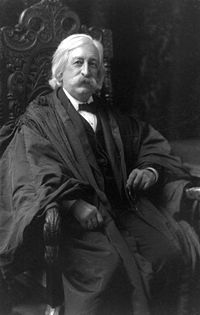Difference between revisions of "Melville Fuller"
From Conservapedia
(Tags: Mobile edit, Mobile web edit) |
m |
||
| Line 17: | Line 17: | ||
'''Melville Weston Fuller''' (1833-1910) was the [[Chief Justice of the United States]] from 1888-1910. | '''Melville Weston Fuller''' (1833-1910) was the [[Chief Justice of the United States]] from 1888-1910. | ||
| − | Melville Fuller was appointed Chief Justice by President [[Grover Cleveland]] in 1888. Fuller managed [[ | + | Melville Fuller was appointed Chief Justice by President [[Grover Cleveland]] in 1888. Fuller managed [[Democratic Party]] candidate [[Stephen A. Douglas]]'s campaign in the [[1860 presidential election]]. He was known as a Copperhead Democrat. In 1896, a Fuller Court decision declared that racial [[segregation]] does not violate the [[Equal Protection Clause]] of the [[14th Amendment]] so long as the "[[separate but equal]]" doctrine is followed. The decision allowed the continued existence of [[Jim Crow]] laws for another six decades. |
==References== | ==References== | ||
Revision as of 22:14, June 23, 2021
| Melville Fuller | |||
|---|---|---|---|
| |||
| Former Chief Justice of the U.S. Supreme Court From: July 20, 1888 – July 4, 1910 | |||
| Nominator | Grover Cleveland | ||
| Predecessor | Morrison Waite | ||
| Successor | Edward Douglass White | ||
| Information | |||
| Party | Democrat | ||
| Spouse(s) | Calista Reynolds (1858) Mary Coolbaugh (1866) | ||
| Religion | Episcopalian | ||
Melville Weston Fuller (1833-1910) was the Chief Justice of the United States from 1888-1910.
Melville Fuller was appointed Chief Justice by President Grover Cleveland in 1888. Fuller managed Democratic Party candidate Stephen A. Douglas's campaign in the 1860 presidential election. He was known as a Copperhead Democrat. In 1896, a Fuller Court decision declared that racial segregation does not violate the Equal Protection Clause of the 14th Amendment so long as the "separate but equal" doctrine is followed. The decision allowed the continued existence of Jim Crow laws for another six decades.
